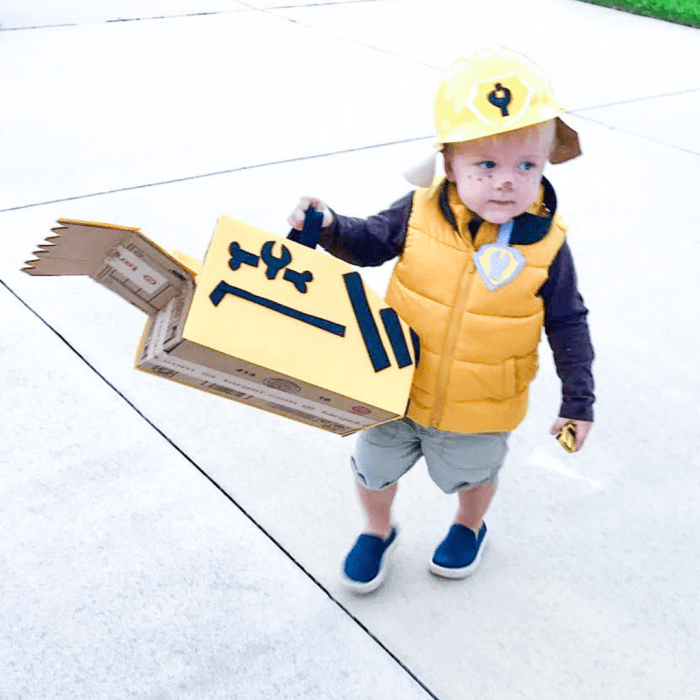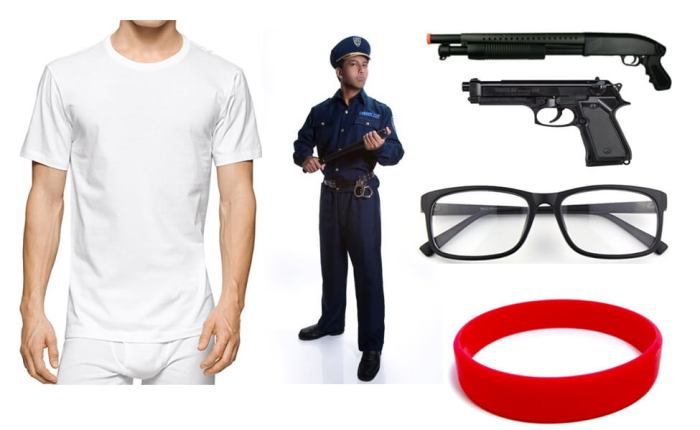Cop Costume DIY: A Guide to Crafting Your Own Law Enforcement Look brings together the excitement of crafting with the allure of law enforcement, offering a detailed roadmap for creating a realistic and fun cop costume for any occasion. Whether you’re aiming for a Halloween masterpiece, a cosplay triumph, or a themed party standout, this guide provides a comprehensive and accessible approach to crafting a cop costume that reflects both authenticity and creativity.
From understanding the essential components of a basic cop costume to mastering the art of crafting realistic accessories, this guide explores the nuances of creating a convincing and safe law enforcement look. With step-by-step instructions and tips for finding affordable alternatives, you’ll be equipped to transform your vision into a compelling costume that captures the essence of law enforcement while respecting the professionalism of those who serve and protect.
Introduction to DIY Cop Costumes

Creating a cop costume can be a fun and engaging project, especially for events like Halloween, cosplay, or themed parties. It allows you to channel your inner law enforcement officer and embrace a sense of authority and heroism. However, it’s crucial to approach this with respect and sensitivity, ensuring your costume doesn’t disrespect or misrepresent law enforcement.
Types of Cop Costumes
There are various types of cop costumes you can create, each with its own unique characteristics and appeal. These costumes can range from classic police officers to specialized units like SWAT or detectives.
- Police Officer: This is the most common type of cop costume, typically featuring a blue uniform with a badge, a gun belt, and a hat. You can add details like handcuffs, a flashlight, and a walkie-talkie to enhance the authenticity.
- Detective: Detective costumes often feature a trench coat, a fedora hat, and a badge. You can add accessories like a magnifying glass, a notepad, and a cigarette to complete the look.
- SWAT: SWAT costumes are characterized by their tactical gear, including a black or camouflage uniform, a helmet, a bulletproof vest, and a weapon. You can add details like a gas mask, a night vision scope, and a tactical flashlight to enhance the realism.
Essential Costume Elements: Cop Costume Diy

A convincing cop costume requires careful attention to detail, and this includes selecting the right elements. These components help to create a realistic and believable look, enhancing the overall impact of your costume.
Choosing the Right Uniform
The uniform is the foundation of any cop costume. It’s essential to choose a uniform that looks authentic and is made from durable materials. A well-chosen uniform will immediately set the tone for your costume, making it look more convincing.
- Police Shirts: These can be found in various colors, including blue, green, and black, depending on the police department you’re trying to emulate. Look for shirts made from a blend of polyester and cotton, which are both durable and comfortable.
- Police Pants: Similar to shirts, pants should be made from a durable blend of polyester and cotton. Consider the specific style of pants worn by the police department you’re representing.
- Police Jackets: These are essential for colder weather and can add an extra layer of realism to your costume. Look for jackets with reflective strips and pockets.
Selecting the Right Badge, Cop costume diy
The badge is a crucial part of any cop costume. It’s a symbol of authority and instantly identifies your character.
- Types of Badges: Badges come in various shapes and sizes, depending on the police department. You can find generic badges online or at costume stores. For a more personalized touch, consider getting a custom badge with your character’s name or initials.
- Materials: Badges are typically made from metal or plastic. Metal badges are more durable but can be heavier. Plastic badges are lighter but may not be as realistic.
- Placement: The badge is typically worn on the left side of the chest, over the shirt pocket. Make sure the badge is securely attached to your uniform.
Adding Essential Accessories
Accessories can help to complete your cop costume and add a touch of realism.
- Handcuffs: These are a classic cop accessory and can be found at most costume stores. Make sure the handcuffs are made from durable materials and are safe to use.
- Belt: A sturdy belt is essential for holding your accessories. Look for a belt with multiple loops and a secure buckle.
- Holster: If you’re carrying a toy gun, you’ll need a holster to keep it secure. Holsters come in various styles and materials, so choose one that matches your costume.
- Flashlight: A flashlight is a practical accessory that can add to the realism of your costume. Look for a flashlight with a strong beam and a durable construction.
- Walkie-Talkie: A walkie-talkie is another practical accessory that can add to the realism of your costume. Look for a walkie-talkie with clear sound and a long battery life.
Finding Affordable Alternatives
You don’t have to spend a fortune to create a convincing cop costume. There are many affordable alternatives available.
- Thrift Stores: Thrift stores are a great source for finding affordable uniforms, shirts, and pants. Look for items in dark colors and simple styles.
- Online Retailers: Many online retailers sell cop costumes and accessories at affordable prices. Compare prices before you buy and look for deals and discounts.
- DIY: If you’re feeling creative, you can make some of your own costume elements. For example, you can sew your own badge or create a holster from leather or fabric.
Creating the Uniform
The heart of your DIY cop costume lies in the uniform. This is where you’ll bring your vision to life, crafting a realistic and convincing look. We’ll guide you through the process of designing, tailoring, and adding authentic details to your uniform.
Sewing and Tailoring
The first step is to gather the right materials. You’ll need fabric, thread, needles, and a sewing machine. For the shirt, pants, and jacket, choose a sturdy cotton blend fabric that resembles the material used in real police uniforms. This fabric should be durable and wrinkle-resistant, as police officers wear their uniforms for extended periods.
- Shirt: Begin by measuring your chest, waist, and sleeve length. Cut out the fabric pieces for the front and back of the shirt, the sleeves, and the collar. Sew the seams together, paying attention to the details, such as the button placket and the collar. Remember to leave an opening for the buttons. You can find free shirt patterns online or at your local fabric store.
- Pants: Measure your waist, hips, and inseam. Cut out the fabric pieces for the front and back of the pants, the legs, and the waistband. Sew the seams together, ensuring a comfortable fit. You can also use a commercial pants pattern or find free patterns online.
- Jacket: For the jacket, you’ll need a more complex pattern. You can find a pattern online or at a fabric store. Measure your chest, waist, and shoulders to ensure a proper fit. Cut out the fabric pieces and sew them together. You can add details like pockets and a zipper to the jacket.
Adding Authentic Details
To make your costume more realistic, you can incorporate authentic details like patches, badges, and insignia. You can find these items online or at costume stores. Remember to choose patches and badges that are relevant to the police department you’re trying to represent.
- Patches: Patches can be sewn or ironed onto the shirt, jacket, or pants. They often feature the department’s name, logo, or unit designation.
- Badges: Badges are usually worn on the chest of the shirt. They typically feature the officer’s name, badge number, and the department’s emblem.
- Insignia: Insignia can be sewn onto the sleeves or collar of the uniform. They often represent the officer’s rank or specialty.
Choosing the Right Colors
The color of your uniform will depend on the specific police department you’re trying to emulate. Most police departments use dark colors like navy blue, dark green, or black. You can find the specific color codes for different departments online.
“It’s important to note that wearing a uniform that is too realistic could be considered impersonation, which can be illegal in some jurisdictions.”
Creating a DIY cop costume is an engaging and rewarding project that allows you to unleash your creativity while embracing the spirit of law enforcement. By following the steps Artikeld in this guide, you can craft a costume that is both realistic and respectful, capturing the essence of law enforcement without crossing any ethical boundaries. So, gather your materials, unleash your imagination, and get ready to create a cop costume that will turn heads and make a lasting impression.
Creating a convincing cop costume for Halloween can be a fun challenge, especially if you want to include realistic details. One crucial element for a believable officer look is the right uniform, which often includes a badge and a gun holster. However, if you’re aiming for a more comedic approach, you might consider adding a funny accessory like a pair of oversized sunglasses or a fake “police scanner” – perhaps even one that plays the iconic “lasix” theme song! Lasix is a popular diuretic, but its catchy name could add a humorous touch to your costume.
Ultimately, the best cop costume is one that reflects your personality and sense of humor, whether it’s serious, silly, or somewhere in between.
